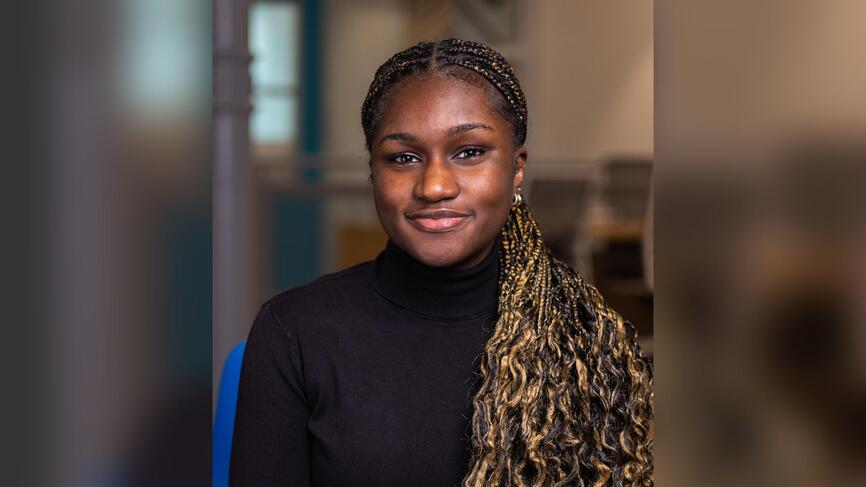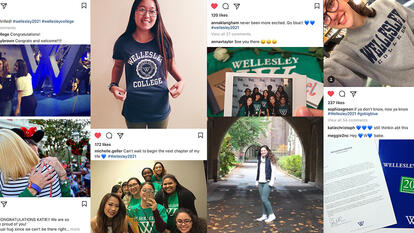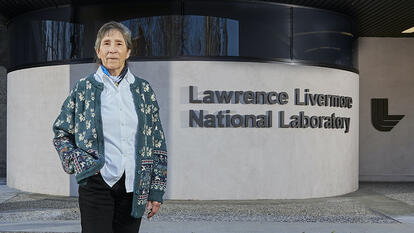
Taking an untraditional path to Wellesley
Jacqueline Yentumi ’26, a first-generation college student and scholar in the Kaplan Leadership Program, earned her associate’s degree from Borough of Manhattan Community College in New York before she transferred to Wellesley this fall. A prospective data science major, she says her interest in computer science and technology drew her to the College.
“In previous computer science courses I had taken, men often talked over me, and my ideas were disregarded. … I’m passionate about making other women of color feel comfortable in tech-oriented spaces,” she said. She thought attending a college like Wellesley could be empowering, allowing her to acheive her goals.
While most Wellesley students arrive as first-years immediately after completing high school, others transfer from another institution, like Yentumi, or join the community after spending many years away from academia through Wellesley’s Davis Degree Program. No matter when in their academic careers these students arrive on campus, the College offers a variety of orientation programming to make sure they feel like they belong just as much as the students who arrived as first-years.
Emily Bader ’18, who transferred from American University in fall 2015, remembers hearing about Wellesley from her mother and godmother, who are alums, but she didn’t apply as a high school student. She didn’t think she wanted to go to a place like Wellesley. “But when I arrived at my medium-sized, coed university in the middle of a city, I realized Wellesley was exactly the kind of experience I wanted.”

Bader says one of the main reasons she chose Wellesley is its commitment to student leadership development. “The philosophy behind [Wellesley’s motto] Non Ministrari sed Ministrare was a huge draw for me,” she says. “After my experience at a coed university, where I felt lost in the mix and that my voice wasn’t valued, I wanted to be at an institution that not only focused on women’s (and other historically undervalued) voices and education but actively encouraged us to use them.”
Yentumi, who also came from a larger school, appreciates the size and structure of her classes. “I definitely like having a close connection with my professors and classmates, and I think I learn better in spaces with smaller class sizes,” she says. “Wellesley places a strong emphasis on critical thinking, especially in class discussions, which was very new to me. Because we’re encouraged to take classes that interest us, everyone is so passionate about the topics we discuss in class, and everyone always has something to contribute. … I think that makes class really fun and special.”
As a senior, Bader was an orientation mentor, inspired in part by the support she had received as a transfer student. “My transfer mentor group really kept me afloat during my first few months at Wellesley,” she says. “We had the unique experience of transferring to Wellesley and understood the challenges that came with that, and having that community was valuable as we settled in and found our place.”
Yentumi says her orientation mentor group helped her find community when she arrived on campus. “My orientation mentor made a group chat, and I think having that space to message each other and then being able to hang out with other transfer students in my orientation group on campus was really nice,” she says.
Tara Hollis, director of orientation and transition programs, includes all transfer students in the new student orientation program, which has virtual and in-person components. Hollis also makes sure that transfer students are paired with orientation mentors who were transfer students themselves. “This allows them to get to know one another, find some camaraderie in their unique experience, and build relationships with a sib that’s been there before,” says Hollis. “We also have a few programs during orientation that are specifically geared toward transfer students.”
Hollis also holds programs for nontraditional students to come together and connect throughout the school year, and last year a group of transfer students approached her about forming a student-led support group. “They formed the Non-Traditional Network over the summer and held a launch event at the beginning of the semester with 30-plus nontraditional students in attendance,” Hollis says. “They’ve had several events this semester that have been fairly well attended and intend to do more programming in the spring. It’s a really special group.”
Some of Wellesley’s nontraditional students who are beyond traditional college age applied to Wellesley through the Davis Degree Program. Established as the Continuing Education Program in 1971 and later renamed for Elisabeth Kaiser Davis ’32, the program was founded to expand the College’s mission. Known as Davis Scholars, these students are generally at least 24 years old and have begun but not completed a bachelor’s degree.
Working with and getting to know the Davis Scholars on an intimate level has been one of my favorite aspects of being at Wellesley and a highlight of my career.
Kelly Lewis, director of the Davis Degree Program
Like transfer students, Davis Scholars participate in both the virtual and in-person new student orientation programs.
“Because of the distinctiveness of the Davis Degree Program and the very different perspectives and life experience these students bring to our community, Davis Scholars have a modified schedule that allows for a more personalized and intimate orientation program with me as their primary resource,” says Kelly Lewis, the program’s director. She says her goal is to ensure that nontraditional-aged students have an opportunity to benefit from an excellent liberal arts education.
“Working with and getting to know the Davis Scholars on an intimate level has been one of my favorite aspects of being at Wellesley and a highlight of my career,” says Lewis, who joined Wellesley in July 2022. “I am so blessed to work with, support, and learn from such a phenomenal group of students.”
Moriah Lit DS ’23 went back to school at age 32, earning her associate’s degree from Community College of Philadelphia in 2021 before coming to Wellesley as a Davis Scholar that fall.
“The funny part is I didn’t know the Davis Degree Program existed when I applied to Wellesley,” Lit says. “I assumed I would be put into the same applicant pool as traditional-age students, but after I applied, someone [in Wellesley’s Office of Admission] reached out and told me I would be a better fit for the Davis Degree applicant pool.”
More than 900 students have graduated from the Continuing Education/Davis Degree Program at Wellesley, including Ophelia Dahl DS ’94, co-founder of Partners In Health; Diana DiZoglio DS ’11, the current state auditor of Massachusetts; and Angela Carpenter DS ’99, now an associate professor of cognitive and linguistic sciences at Wellesley.
For some Davis Scholars, like Lit, finding community at Wellesley can be challenging at first. “At 36, I was the oldest student on campus for a while, and I think I felt kind of out of place for the first two months, but eventually I felt like Wellesley was where I was supposed to be,” Lit says.
Lewis says she strives to create a strong sense of community and belonging among Davis Scholars. “During my weekly drop-in hours at the Continuing Education House and at our community lunches, I hear firsthand accounts of some of the challenges some of these students face in and outside of the classroom as nontraditional Wellesley students,” she says. She has reintroduced a peer mentoring program, where first-year Davis Scholars are paired with returning ones who offer additional support and guidance.
Lewis also encourages Davis Scholars to participate in student clubs and organizations and to apply for different educational and professional opportunities: “I’m constantly reminding the Davis Scholars that they, too, are entitled to all that Wellesley has to offer, and if there’s something out there that is interesting or exciting to them, they should go for it!”
Lit agrees. “If an email comes your way about a grant or a study abroad program, apply!” she says. “Spend the extra 10 minutes after class to talk to your professors, and go to office hours. … Really, just take advantage of every opportunity.”
—
If you are interested in applying to Wellesley College as a transfer student or Davis Scholar, you can find more information here. The application deadline for the 2024–2025 academic year is in mid-March.



